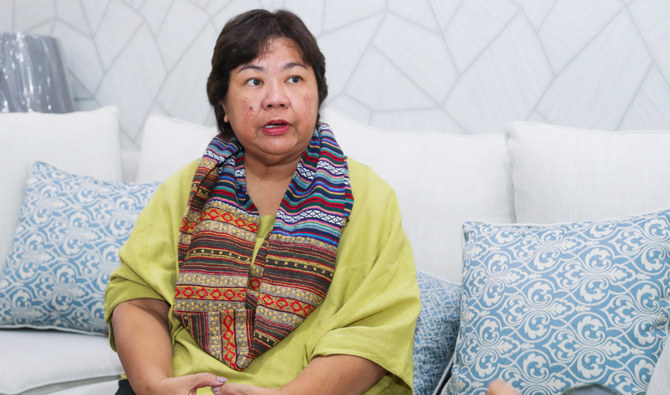RIYADH: In her recent visit to Saudi Arabia, Philippine Secretary of Migrant Workers Susan Ople met with Saudi government officials to discuss developing bilateral relations between the two countries, working conditions for overseas Filipino workers, and to create awareness around common issues.
Sitting at the Philippine Overseas Labor Office, the soon-to-be new Migrant Workers Office, Ople told Arab News that the purpose of her visit to the site is to oversee processes, learn more about the concerns of the workers, and of the inner mechanisms of the office.
During her visit, the secretary met with her counterpart at the Saudi Ministry of Human Resources and Social Development, Ahmad Al-Rajhi.
“We had a very pleasant conversation. We are creating new pathways to further strengthen the long, historic friendship between the Philippines and Saudi Arabia,” Ople said.
HIGHLIGHT
The goal of establishing the new Migrant Workers Office is to equip OFWs with the right resources, information, protection, and opportunities while working in Saudi Arabia, creating a ‘home for every migrant worker in government,’ Philippine Secretary of Migrant Workers Susan Ople said.
Saudization, the policy of creating and prioritizing opportunities for Saudi workers, was established as a key goal for the Kingdom’s Vision 2030, and Ople expressed her respect and understanding for the policy.
“We also have our own employment strategies in the Philippines, so Saudization and making sure that your own nationals are gainfully employed is something we respect.
“It’s very important that we keep talking with our counterparts in the Saudi government, because it’s only in having these bilateral conversations that we can guide our people accordingly,” she said.
One of Ople’s key goals is to undergo systems reviews to ensure the safety of the workers under their employers, both in the Philippines and in administrations abroad.
“It’s a necessary step towards reforms. Because we are a department in transition, we need to look at the old and current processes, and just see how to strengthen, improve, or perhaps even do away with some of them,” she said.
The goal of establishing the new Migrant Workers Office is to equip OFWs with the right resources, information, protection, and opportunities while working in Saudi Arabia, creating a “home for every migrant worker in government,” she said.
Last year, Saudi Arabia’s expatriate population of 13.49 million included about 1.6 million OFWs.
One of the initiatives by the Labor Department is establishing a One Repatriation Command Center. The 24 hour hotline is dedicated to serving Filipino residents in Saudi Arabia with any issues that arise by dialling 1348.
“Any Filipinos, their families who wish to come home because they are ill, or because there are certain violations in the contract, or are victims of human trafficking … can call up our hotline,” Ople said.
The secretary is an advocate against human trafficking, even being awarded the Trafficking in Persons Hero Award from US Secretary of State John Kerry, and was appointed trustee of the UN Trust Fund for Human Trafficking victims.
“I am quite optimistic that there is room for a partnership. We can work with different countries here across the Middle East in promoting awareness about the need to fight human trafficking, especially involving migrant workers, because some of them are extremely vulnerable to severe exploitation and abuse,” she said.
As an advocate, Ople also highlighted the importance of fair and ethical recruitment policies that adhere to human rights labor laws and promote fair wages.
“The recruitment agencies, the country of destination, the employers; they should all adhere to a human rights-based approach to the recruitment and hiring of migrant workers, whether they be Filipinos or whatever nationality,” she said.
Ople made a visit to Bahay Kalinga shelter in Riyadh, a safehouse for runaway maids, to check in on the situations of distressed OFWs and to provide a platform to express their issues.
Those talks found their way to Ople’s conversation with Al-Rajhi, who promised to look into the cases.
“It was an emotional visit … they were able to tell me about their journey as migrant workers here in Saudi Arabia. Some were not able to complete their contracts. Some complained about the treatment that they got. Others were just wishing to go home.
“I think it’s the role of our department to just look at how these problems can be solved and addressed and perhaps prevented, so that less and less of these women need to go home with so many invisible scars,” she said.
Aside from domestic abuse, some of the biggest issues OFWs face is cultural adaptation, proper education about their rights, and access to the justice system.
Ople hopes to establish clear legislation that ensures transparent terms and conditions of work, on-time salary payments, communication opportunities with family, proper rest time, and physical and mental health support for workers.
The agreement of domestic workers, ratified in 2014 by Saudi and Filipino parties, is a significant milestone in the field of labor cooperation and in the protection of the rights of Filipino workers.
“It is very important that we keep reviewing and even improving upon the bilateral labor agreement that we had with Saudi Arabia, and which is why we are here for the talks, and also why we appreciate the hospitality being shown by our Saudi counterparts,” she said.
Ople will join officials once again in December for a joint committee meeting, returning to Riyadh to have those formal talks.
















